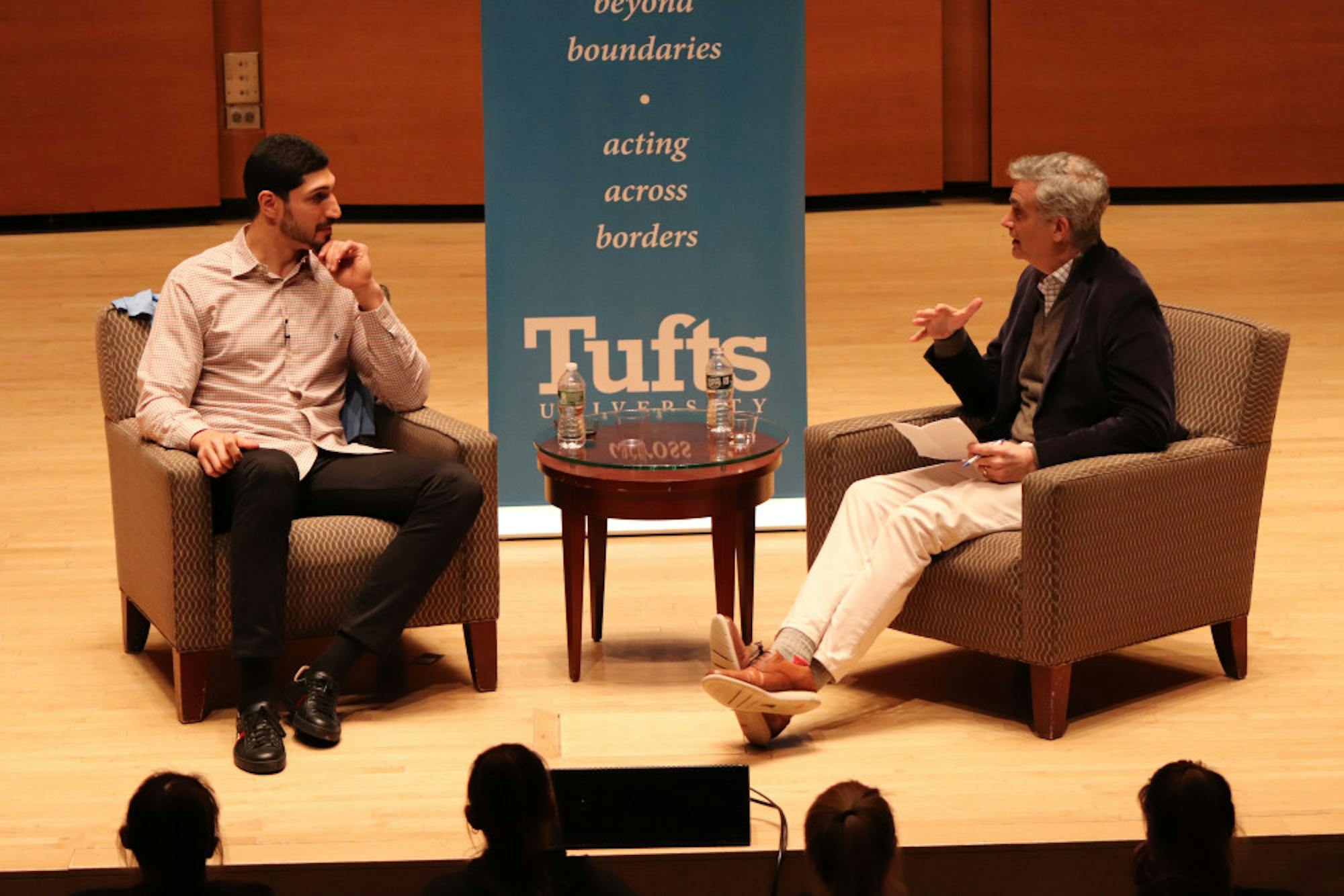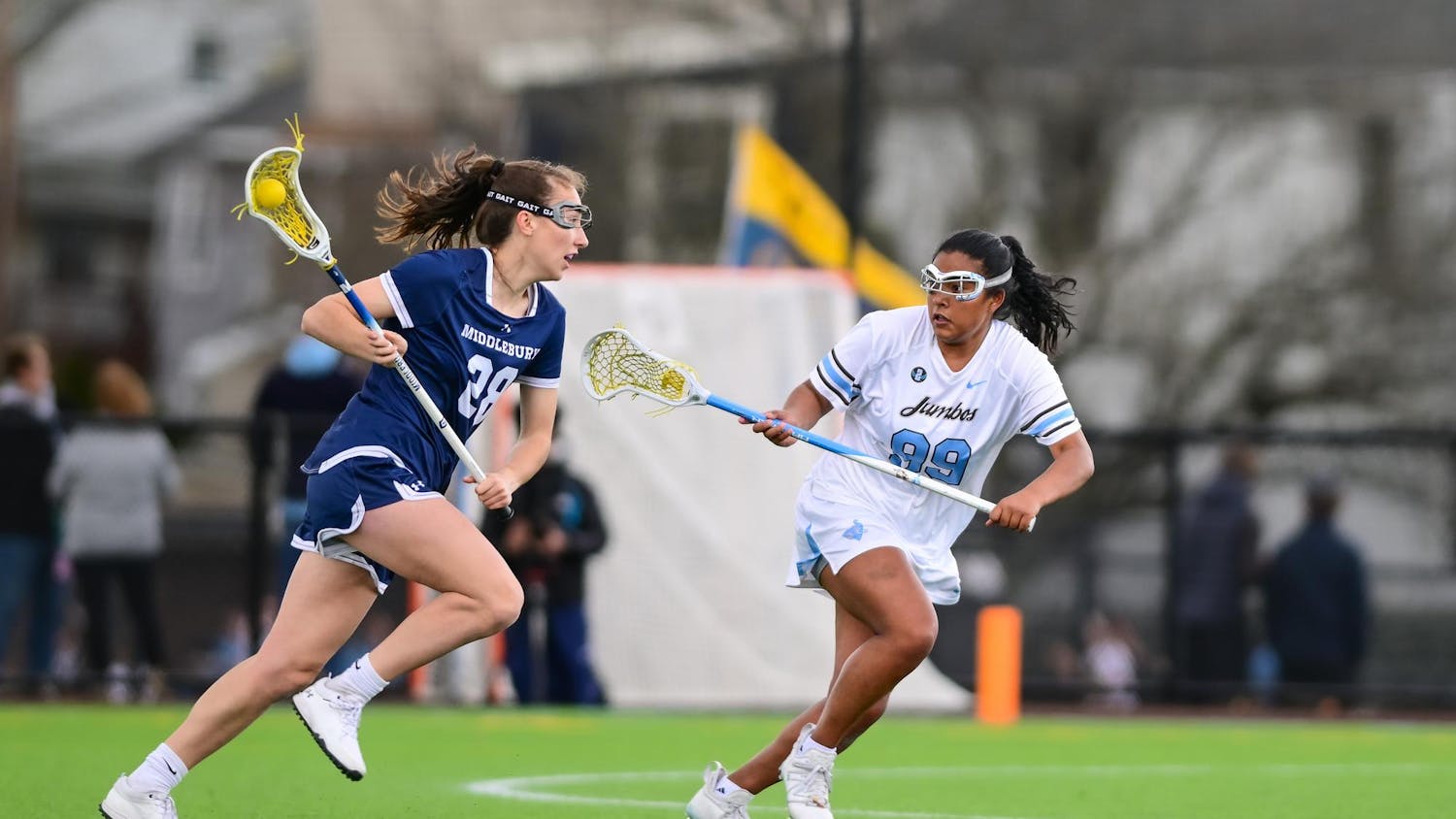The Institute for Global Leadership (IGL) hosted a talk with Enes Kanter of the Boston Celtics on Friday night. Kanter, the 6’ 10” center from Turkey, has been outspoken about the political situation and human rights abuses in his home country and is currently labeled a domestic terrorist by Turkey’s president, Recep Tayyip Erdoğan, for supporting the movement led by Fetullah Gülen, who Erdoğan blames for the 2016 attempted coup d’etat. Much of the talk focused on how Kanter manages his professional basketball career along with his involvement in activism and politics.
The event, held in Distler Performance Hall, was moderated by Boston Globe Magazine journalist Neil Swidey (LA’91) and was co-sponsored by the Jonathan M. Tisch College of Civic Life.
Director of IGL Abi Williams (F’86, F’87) began the evening by welcoming the crowd and thanking the sponsors. Then, junior Connor Doyle, an IGL student, introduced Kanter and listed his accomplishments to the sold-out audience, which included several people sporting Celtics gear.
“Over the course of his career, Mr. Kanter has been an activist, working to help people and speaking out against injustice,” Doyle said.
The women’s basketball team — which had just finished an undefeated regular season and was preparing for the NESCAC semifinals on Saturday — was in attendance, so Swidey began the talk by asking Kanter about his recent op-ed in Time about gender pay disparity in the WNBA.
“[WNBA players] don’t get the same recognition that they deserve,” Kanter said. “Once I put the article out, of course I had so many haters out there. … I give them a really great example. Michael Jordan — flu game. Obviously, one of the most legendary moments. How many people know that Skylar Diggins-Smith was playing and pregnant the whole season? Not many people are talking about that.”
Swidey went on to ask Kanter about his experience first coming to the U.S. to play basketball. Born in Switzerland, Kanter grew up in Turkey and moved to the U.S. at the age of 17 to attend prep school and then the University of Kentucky. But, Kanter was deemed ineligible to play basketball both in prep school and college because of a prior shoe contract he had with Nike.
“One of the biggest reasons why I came to America is that, in Turkey, you can’t go to school and play basketball,” Kanter said. “For me, I turned down lots and lots of money to come to school here and play basketball at the same time.”
Now, Kanter is outspoken about NCAA rules that he sees as too strict.
“The rules they put are just terrible,” Kanter said. “Lots of international players are scared to come to America to play basketball because of all of these rules.”
The majority of the remainder of the talk then shifted to discussing Kanter’s activism and how he uses his platform as a professional basketball player to spread his message.
“I feel really blessed to be in America; we have freedom, we have democracy, we have human rights,” Kanter said. “But we don’t have any of those in my country in Turkey. Because I have the platform, I’m trying to talk about some of these issues in my country that are affecting me and my family.”
Because of his activism and support of Gülen, Kanter has not been able to return to Turkey for several years and avoids traveling internationally, while many of his family members have lost their jobs in Turkey. Kanter’s family publicly disowned him after he criticized Erdoğan on Twitter following the failed 2016 coup d’etat. Now, he can only communicate with a brother who lives in Spain.
“It was tough,” Kanter said about being disowned. “First off, I was thinking maybe they did this so that the Turkish government would leave them alone. But then, I don’t know — I still want to think that.”
But Kanter is still an NBA player. He explained that although he uses his celebrity to promote his activist causes, basketball remains his escape.
“I feel like basketball is my escape,” Kanter said. “Whenever I step on the court, it’s about me and teammates, trying to have fun and win the basketball game.”
With Kanter’s involvement in international politics, activism and philanthropy, a future in politics seems likely. He shared that he often spends time with politicians while in Washington D.C., and he recently spent time with Massachusetts Attorney General Maura Healey.
“First, I was like, are you serious?” Kanter said about those who suggest he pursue politics. “But then I was like, you know what, I think it would be a great career.”
In his final question before opening up the floor to the audience, Swidey asked Kanter about his advice for students in the audience, many of whom are passionate about fighting for change.
“You need to use that platform,” Kanter answered. “And you need to use that platform to talk about the right things. … When I talk about these issues, it can become a larger conversation.”
Kanter also added that, since coming to Boston in 2019, he has noticed that people here are more receptive to his messages.
“Since it’s such an educational town, people come up to me and they say ‘Hey, good article yesterday, good op-ed yesterday, we saw this, we saw that, we read this,’” Kanter said. “And I use that to start a conversation. It’s definitely a blessing to be in this situation.”
Enes Kanter speaks about Turkey, activism, basketball

Boston Celtics player Enes Kantar (left) and Tufts alumnus Neil Swidey (right) converse in front of members of the Tufts community in Distler Performance Hall on Feb. 28.





